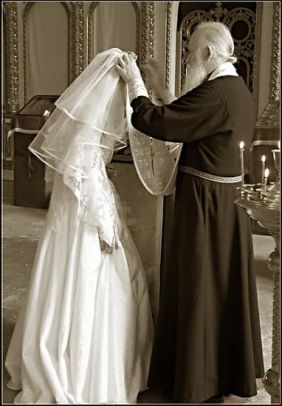 Sometimes, one encounters the opinion that any relations between the sexes is either sin or a forgiveable, permissible weakness. A great deal has been superimposed [upon the understanding of the Church] in this matter by Platonism and monastic ascetic literature. There have been, in the history of the Church, heresies which rejected marriage, and those opinions are sometimes echoed in contemporary moral-theological literature.… The Apostle Paul wrote to the Corinthians: “Know ye not that your body is the temple of the Holy Spirit Which is in you, which ye have of God…. Therefore glorify God in your body, and in your spirit, which are God’s.” (I Corinthians 6: 19-20).
Sometimes, one encounters the opinion that any relations between the sexes is either sin or a forgiveable, permissible weakness. A great deal has been superimposed [upon the understanding of the Church] in this matter by Platonism and monastic ascetic literature. There have been, in the history of the Church, heresies which rejected marriage, and those opinions are sometimes echoed in contemporary moral-theological literature.… The Apostle Paul wrote to the Corinthians: “Know ye not that your body is the temple of the Holy Spirit Which is in you, which ye have of God…. Therefore glorify God in your body, and in your spirit, which are God’s.” (I Corinthians 6: 19-20).
By His Incarnation, Christ sanctified the body, and by His personal presence, He sanctified marriage. It is quite noteworthy that Christ’s first miracle was wrought at the marriage at Cana of Galillee. Those who condemn marriage created the legend that the newlyweds at Cana of Galillee remained celibate, but by no means is that legend founded in Divine Scripture. The Apostle Paul bluntly calls those who forbid entering into matrimony liars, having their consciences seared (see I Timothy 4: 3-2).
The heretical rejection of marriage was condemned in the Canons of the Holy Apostles. The 51st Canon states: “If any Bishop, or Presbyter, or Deacon, or anyone at all on the sacerdotal list, abstains from marriage, or meat, or wine, not as a matter of mortification, but out of an abhorrence thereof, forgetting that all things are exceedingly good, and that God made man male and female, and blasphemously mistrepresenting God’s work of creation, either let him mend his ways or let him be deposed from office and expelled from the church. Let a layman be treated similarly.” The 5th Canon proclaims: “No Bishop, Presbyter, or Deacon shall put away his own wife under pretext of reverence. If, however, he put her away, let him be excommunicated; and if he persists in so doing, let him be deposed from office.”
The 1st Canon of the Council of Gangra states: “If anyone disparages marriage, or abominates or disparages a woman sleeping with her husband, notwithstanding that she is faithful and reverent, as though she could not enter the Kingdom, let him be anathema [i.e. declared outside the Church].” Further, in the 14th and 10th Canons, “If any woman should abandon her husband and wish to depart, because she abominates marriage, let her be anathema and should a celibate exalt himself over one who is married, let him be anathema”
According to the Fathers of the Council of Gangra, we Christians, “welcome continence with modesty and godliness… and anchoritic departures from mundane affairs with humility, and honor modest cohabitation of matrimony.”(Canon 21).
One could cite excerpts from many other, similar Canons, but those already cited demonstrate that the Church had always shown reverence for honorable marriage and defended its sanctity against the heretics and those who falsely assess [marriage], bringing stern canonical measures to bear against them. Citing the example of Aquila and Priscilla, St. John Chrysostom called for us “not to condemn marriage and not to consider as an obstacle or hindrance on the way to the virtue: having a wife, raising children, running the household, and following a craft.” (St. John Chrysostom; Homily 1 on the words “Kiss Priscilla and Aquila and the others.” Talks on various points of Divine Scripture Vol. 2, p. 41.). Aquila and Priscilla were a married couple who were self-employed craftsmen [tentmakers], but who showed far greater love of wisdom than many others who lived in monasteries.
According to Orthodox teaching, only in marriage within the Church do two individuals actually unite, in soul, spirit and body. It is only the relationship of the husband to the wife that is compared to that of Christ to the Church (Ephesians 5: 23, 25).
The sanctity of marriage as defined in the Epistles of the Holy Apostles encompasses as well intimate relations between the husband and wife, individuals who complement and love one another: “And the two shall be one flesh”. This most secret of moments in the life of a married couple can be holy, if it is the result and symbol of their complete spiritual and mental intimacy and physical accord. This is a special stage of interrelationship. Sometimes one can observe that the eyes of newlyweds shine with new bounds of love and happiness. For this, we may thank God, remembering that “all things are exceedingly good, and that God made man male and female.” (51st Canon of the Holy Apostles).
In the early Church, the newlyweds spent their first week of marriage as brother and sister, and wore church crowns. This was done so that the marriage might be chaste, so that a spiritual, prayerful foundation might reign within it, so that the young couple might intelligently and with consideration open up to one another. Only on the 8th day, following the removal of the crowns would they turn to other forms of interrelation. This facilitated their placing a far deeper value on all of the steps of growing intimacy in married life and love.
Currently, the crowns are removed at the end of the rite of Holy Matrimony, with the reading of the prayers for the removal of the crowns on the 8th day, a prayer which has retained its ancient title. The newlyweds are no longer required to observe the rule of chastity during the first week of marriage.
Conjugal relations demand patience and tenderness, enormous tact and mutual agreement. The woman should not be subjected to trauma; she should derive joy from the new revelation of her husband’s person and character, of his love for her and her love for him.
To maintain one’s chastity, if not for a week, then at least for two or three days following the Crowning, is to make a deposit toward the chastity of the marriage. It permits the couple to unhurriedly comprehend the Mystery taking place, and to see this new event as a stage in the development of their marriage union. While there is no need to hurry in this matter, one also should not put it off until the threshold of an approaching fast, unless there is a special reason for such delay. It is better not to enter into marriage on the eve of a fast, on the last day on which the rite of Holy Matrimony is permitted, but rather to enter into marriage after the fast, or at the very least, two or three weeks before the beginning of the fast. This of course is not a decision of the Church, but only a recommendation, a wish for those preparing to enter into marriage. In general, one cannot give any overall, absolute directions with respect to intimate conjugal relations except for the one formulated by the Apostle Paul: “The wife hath not power of her own body, but the husband; and likewise also the husband hath not power of his own body, but the wife.” (I Corinthians 7: 4). The husband must remember the second part of that formula, and not merely demand satisfaction of the first part. It is better at first to grant the initiative to the wife, rather than allow even the shadow of coercion in mind or body to be cast over her.
In blessing marriage and the marriage bed (“an honorable marriage and a bed undefiled, a bed undetested” – words pronounced during the great litany at the Betrothal Service), the Church teaches peace and temperance in conjugal relations. Before eating, an Orthodox Christian reads a prayer; if a priest is present, the priest asks: “Bless, O Lord, the food and drink of Thy servants.” However, the Church condemns gluttony and drunkenness as sin. Likewise, while blessing marriage, the Church condemns a married couple’s making sexual relations their exclusive focus of mutual interest. When sex dominates a marriage, it becomes a hiding place for depravity. When a husband who has argued with his wife demands her body, or when he only makes up with her in order to dominate it, sexual sin occurs within marriage as well.
Writing about Christian married couples, St. Clement of Alexandria states: “Man needs to abstain from sensuality .… [in these matters] there must be limits and moderation.” An absence of temperance, a state in which sensuality is substituted for love, prevents the couple from fully perceiving one another’s makeup, i.e. the three parts comprising the individual. In marriage, temperance and moderation are essential. Of monastics, total abstinence is demanded. I am fortunate that, “all things are lawful for me, but I will not be brought under the power of any.” (I Corinthians 6: 12) A period of fasting teaches one to control his senses and his body; it requires temporary abstincence from conjugal intimacy.… During this period, the Christian should be filled with “joy in God,” something to which all other forms of joy should defer.
Only moderation and temperance, a married couple’s spiritual and emotional/physical intimacy, the all-encompassing nature of their love, renders sacred and joyous the moment of physical union, which becomes the expression and profound symbol of their mutual love and complete intimacy. The Holy Apostle Paul writes: “Defraud ye not one the other, except it be with consent for a time, that ye may give yourselves to fasting and prayer; and come together again, that Satan tempt you not for your incontinency.” (I Corinthians 7: 5).
Esteeming “honorable marriage” and “a bed undefiled,” the Church condemns pre-marital and extra-marital sexual relations, considering them to be a mortal sin. St. Basil the Great writes “Fornication is not marriage, and not even the beginning of marriage.” (2nd Canonical Epistle, Rule 26). According to the Canons of the Church, one who has had pre-marital relations, even with his own betrothed, cannot become a priest. (Canon 68 of St. Basil the Great).
What is “acceptable” to a non-believer, does not fail to have consequences for a Christian: To whom much is given, of him will much be demanded. Those who cannot maintain their chastity before marriage ordinarily do not contain themselves within marriage either. A former heretic who becomes Orthodox can become a priest, but an Orthodox Christian who has once commited the sin of adultery or who has been married twice (even after the death of his first wife) cannot be ordained to the priestly dignity. (Canon 17 of the Holy Apostles, Canon 12 of St. Basil the Great).
Orthodox young people must block from their thoughts even the possibility of pre-marital relations. This applies as well to those preparing to enter into a second marriage. We emphatically reiterate: pre-marital relations, even with one’s future spouse, are comparable to attempting to serve the Liturgy without possessing the grace of the priesthood. The one is called fornication, the other, sacrilege. Such a comparison is apt, for the marriage union between a husband and wife is comparable to that of Christ and the Church. The comparison seems jarring to the ear only because we have become all too used to the fact of pre-marital relations, but have almost never encountered the above-mentioned sacrilege.
The maiden should, as her very nature demands, be watchful, and maintain the purity of her relationships prior to marriage. In this matter, there can be no “ekonomia” or “condescension.”
We recognize the faithful and honorable marriage of non-believers, and, if they should come to the Faith and be drawn to the Church, we, with love, crown them with wedding crowns. If they have been true to one another, no sin is is imputed to them. Our words are directed to those so-called members of the Orthodox Church who with their pre-marital relations reject the grace of God and fall into a double sin: the sin of fornication and of repudiation of the grace of God.
The New Testament, established by Jesus Christ, changed the relationship between God and man, and in so doing changed human interrelationships, first and foremost those between husband and wife. One must remember that when reading the Old Testament and when observing family life in the external world. Our Christian marriage must be a New Testament one.
“And the very God of peace sanctify you wholly; and I pray God your whole spirit and soul and body be preserved blameless unto the coming of our Lord Jesus Christ. Faithful is he that calleth you, who also will do it.” (I Thessalonians 5: 23-24).
Be daring and be sober. Having entered into marriage, having united “in one flesh,” “as lively stones, are built up a spiritual house,” (I Peter 2: 5), be one double Temple of our God.

















